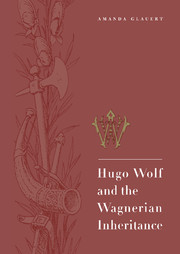Book contents
- Frontmatter
- Contents
- Acknowledgements
- Introduction
- 1 ‘Music of the future’? The nature of the Wagnerian inheritance
- 2 ‘Wagner of the Lied’? Wolf as critic of Wagner and Wagnerism
- 3 Small things can also enchant us – Wolf's challenge to nineteenth-century views of song
- 4 ‘Poetry the man, music the woman’? Wolf's reworking in his Mörike songs of Wagner's aesthetics of words and music
- 5 The integrity of musical language – questions of form and meaning in Wolf's Goethe songs
- 6 The Wolfian perspective – comparisons with the songs of Strauss and Mahler
- Notes
- Bibliography
- Index
Introduction
Published online by Cambridge University Press: 31 October 2009
- Frontmatter
- Contents
- Acknowledgements
- Introduction
- 1 ‘Music of the future’? The nature of the Wagnerian inheritance
- 2 ‘Wagner of the Lied’? Wolf as critic of Wagner and Wagnerism
- 3 Small things can also enchant us – Wolf's challenge to nineteenth-century views of song
- 4 ‘Poetry the man, music the woman’? Wolf's reworking in his Mörike songs of Wagner's aesthetics of words and music
- 5 The integrity of musical language – questions of form and meaning in Wolf's Goethe songs
- 6 The Wolfian perspective – comparisons with the songs of Strauss and Mahler
- Notes
- Bibliography
- Index
Summary
If we were seeking a context to help in understanding the music of Hugo Wolf, then one might wish for a less problematic one than his relationship to Wagner and the Wagnerian inheritance. As critics, we usually seek to go beyond composers' efforts at self-validation, however eloquent and moving they may be; one might say it is a sign of our serious regard that we do not simply accept their acknowledged and immediate stories of influence and intention, but look also for the unspoken aspects which reveal the human engagement behind their work. Yet it was precisely such critical activity that Wagner sought to bypass, offering his own view of music history that extended beyond personal actions; he purported to account for much of the broader working of culture and bring this also within a single fixed perspective. More striking still, Wagner made a conscious exhibition of his struggles for artistic coherence and identity both in his writings and in the music dramas themselves, offering himself as his own critic – an artist of complete awareness and control.
Wagner's claims, as the philosopher Friedrich Nietzsche recognised, helped provoke a crisis in criticism that we are still addressing today, a crisis that gives urgency to the uncovering of multiple layers in the interpretation of Wagner's work and in the pursuit of musical meaning in general.
- Type
- Chapter
- Information
- Hugo Wolf and the Wagnerian Inheritance , pp. 1 - 3Publisher: Cambridge University PressPrint publication year: 1999

